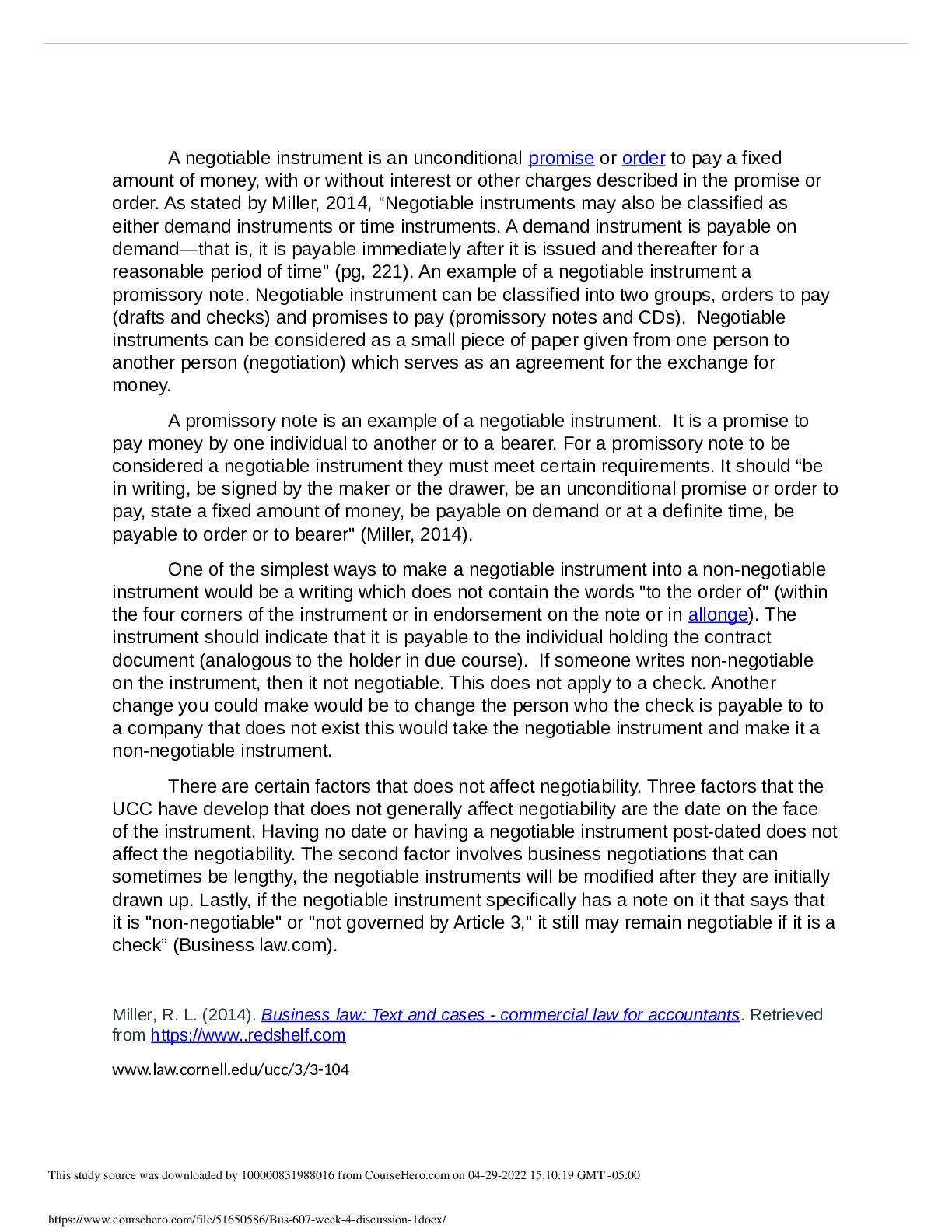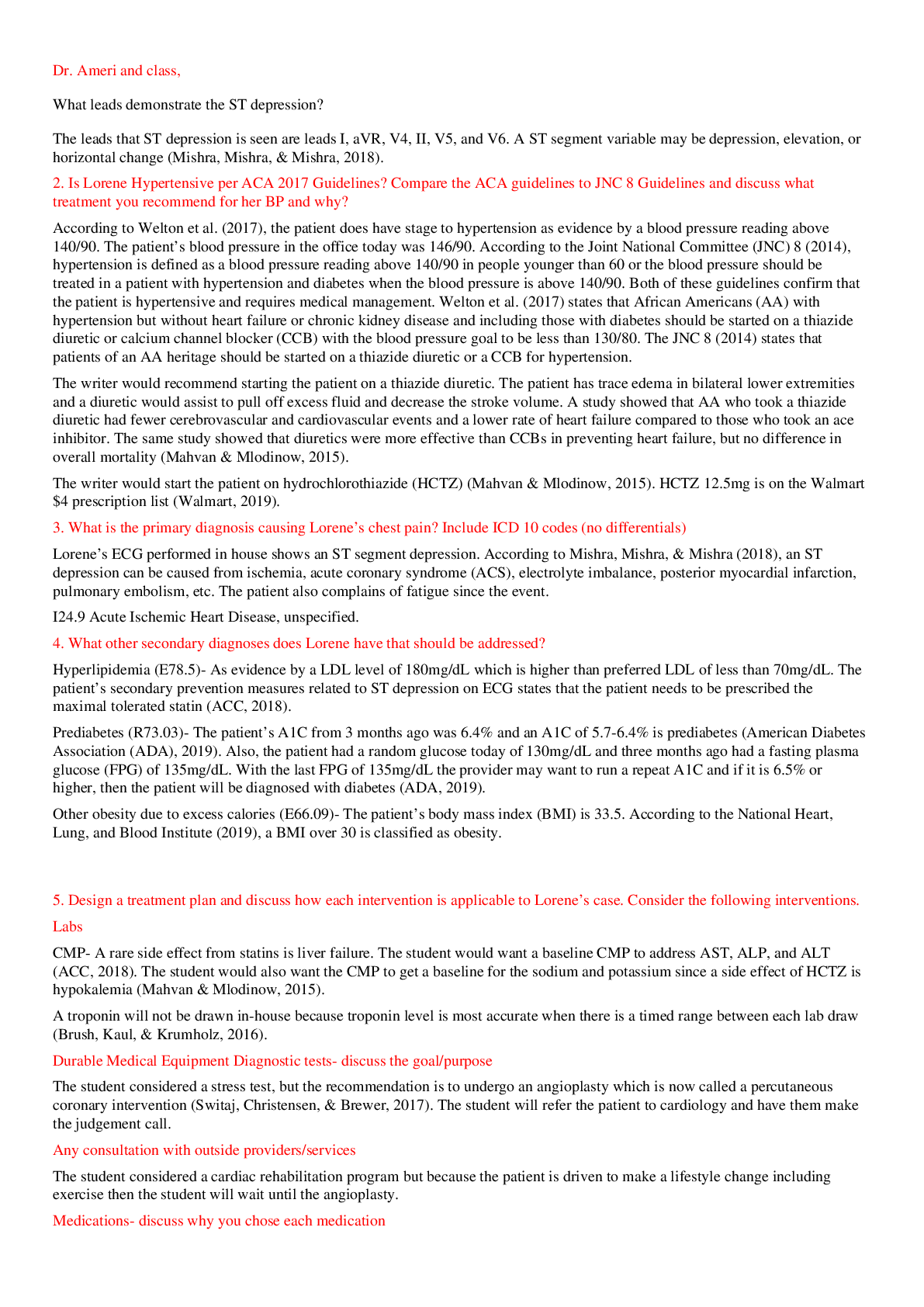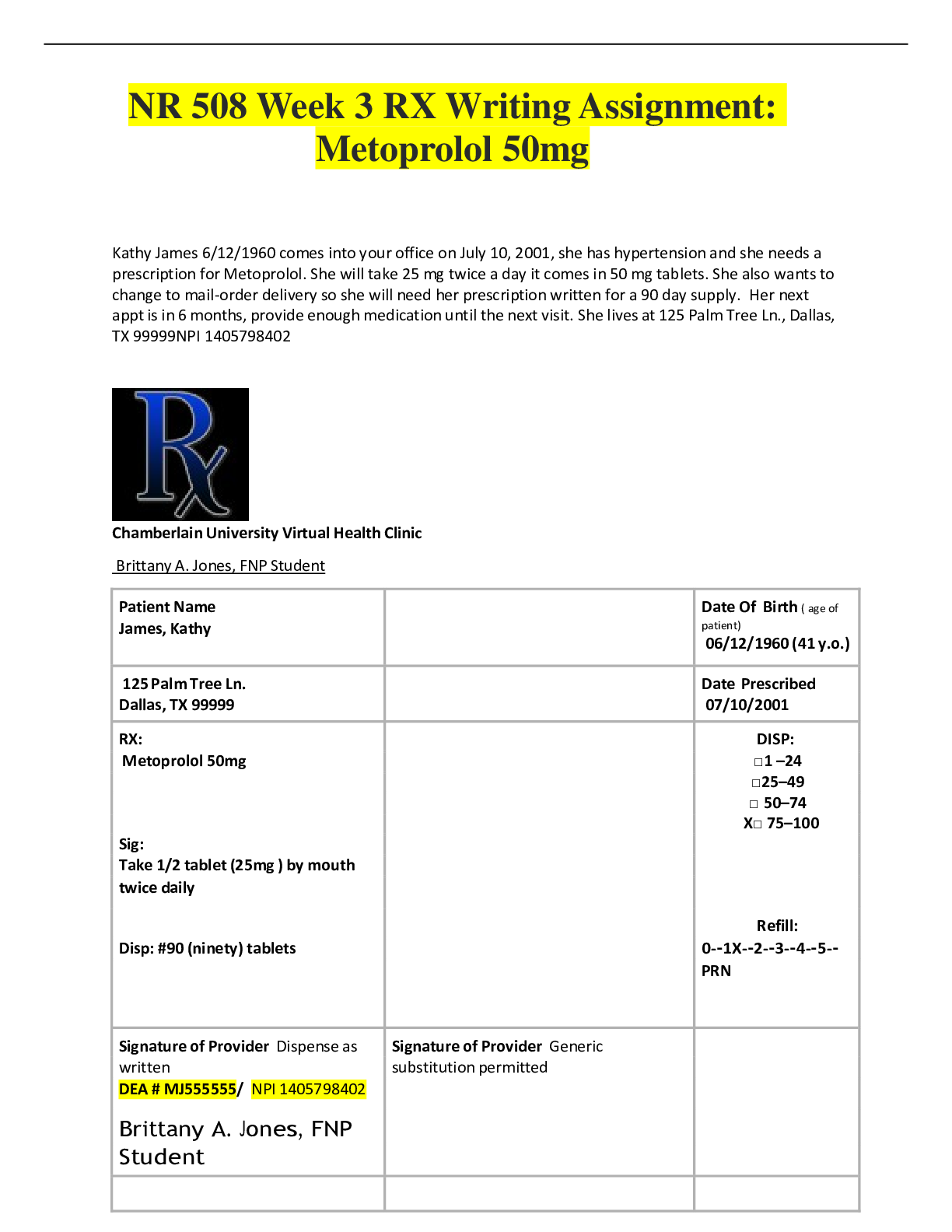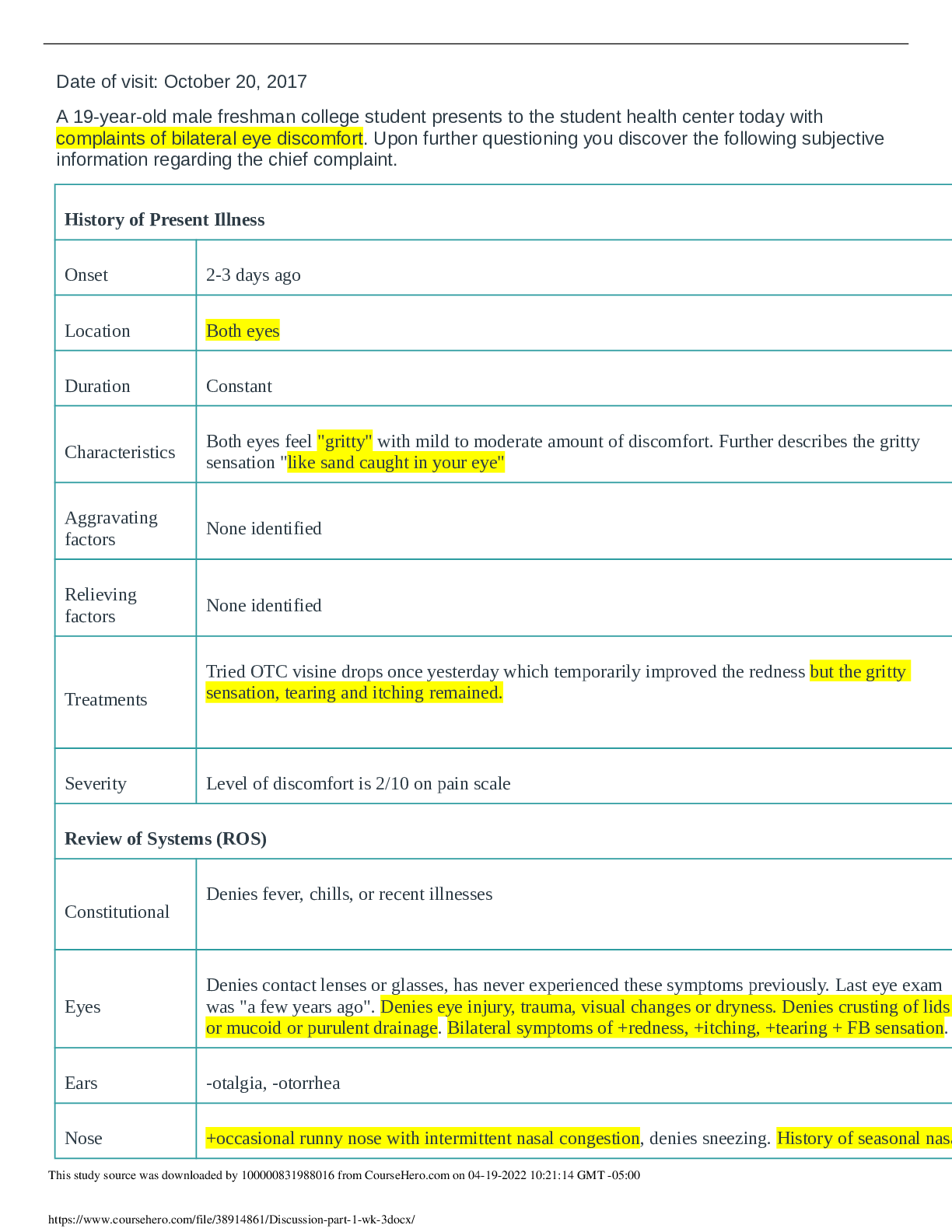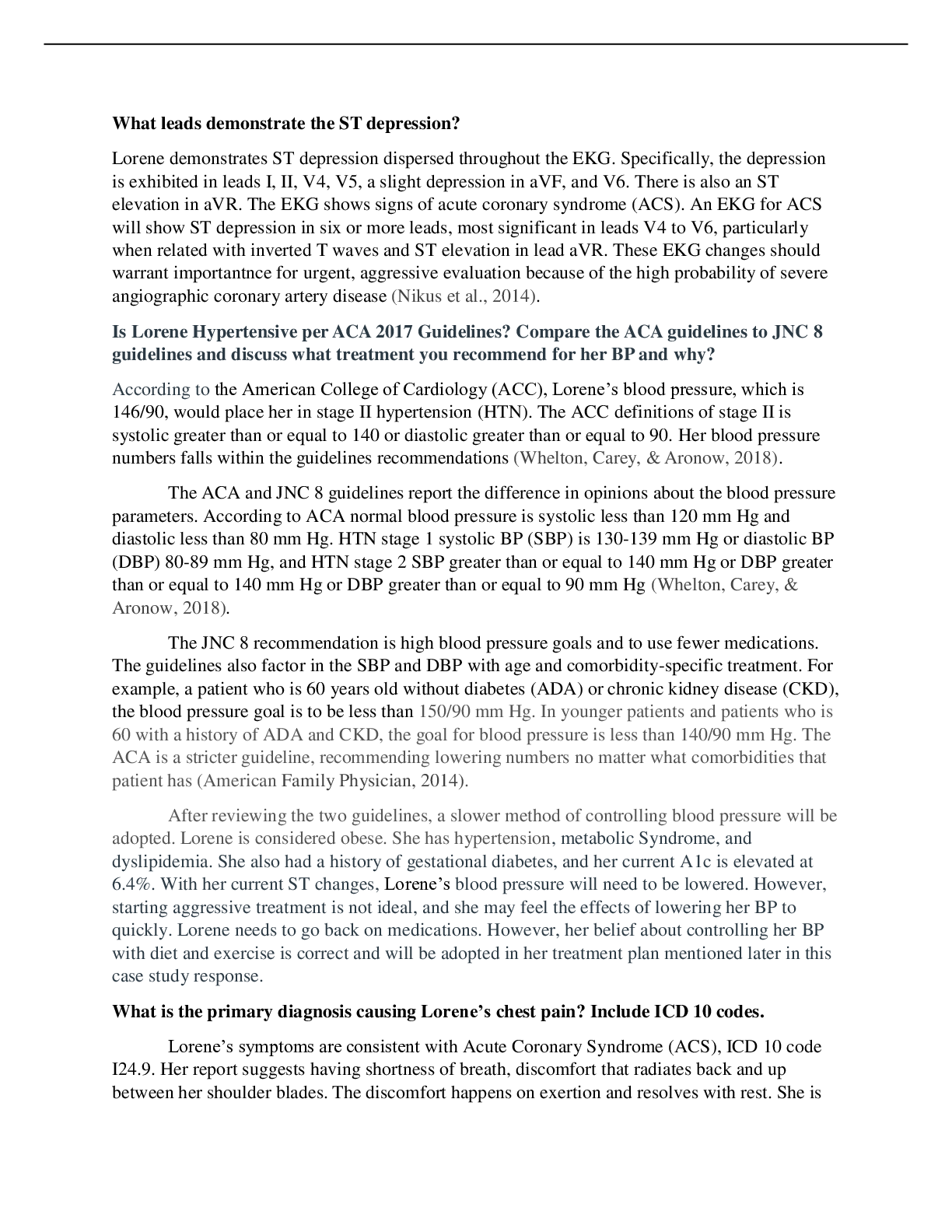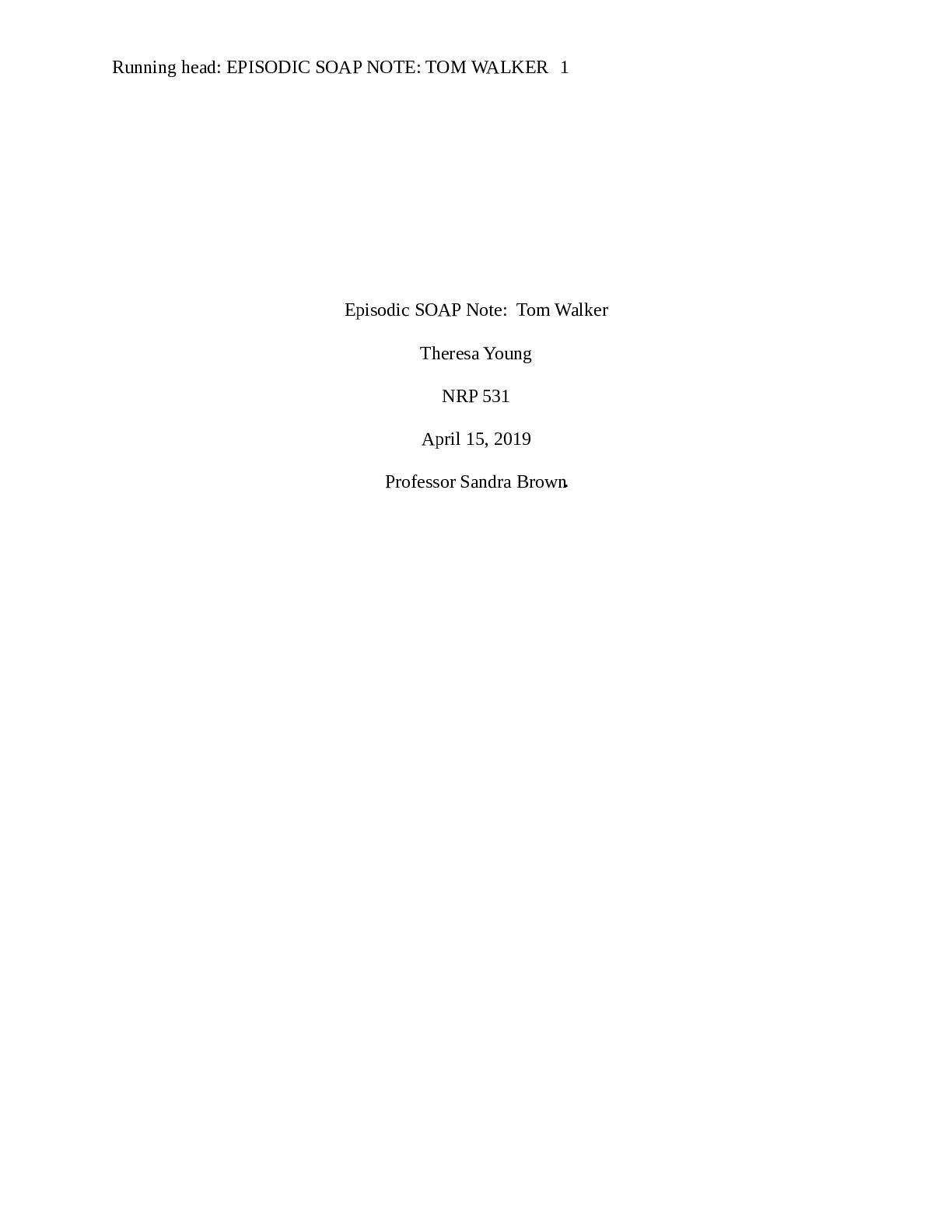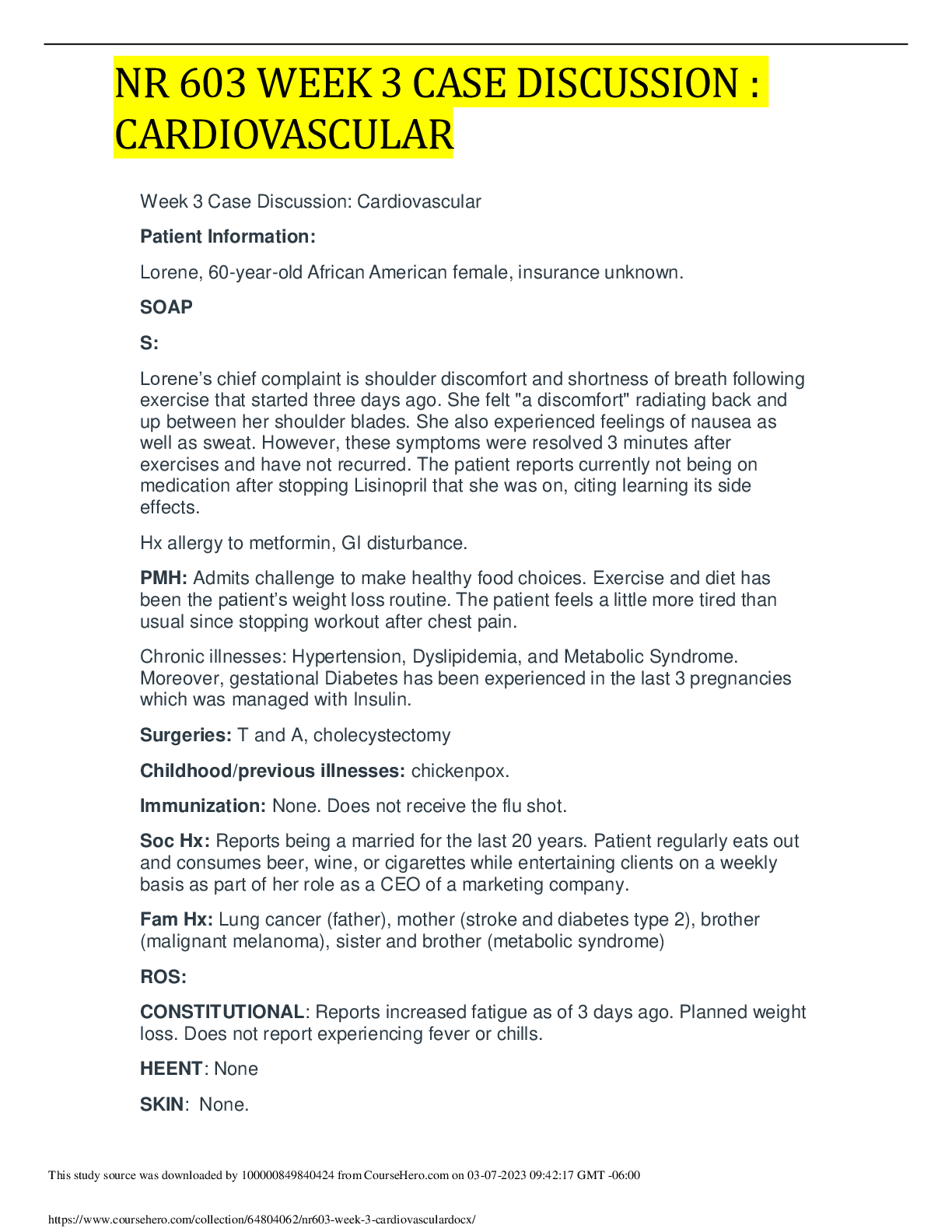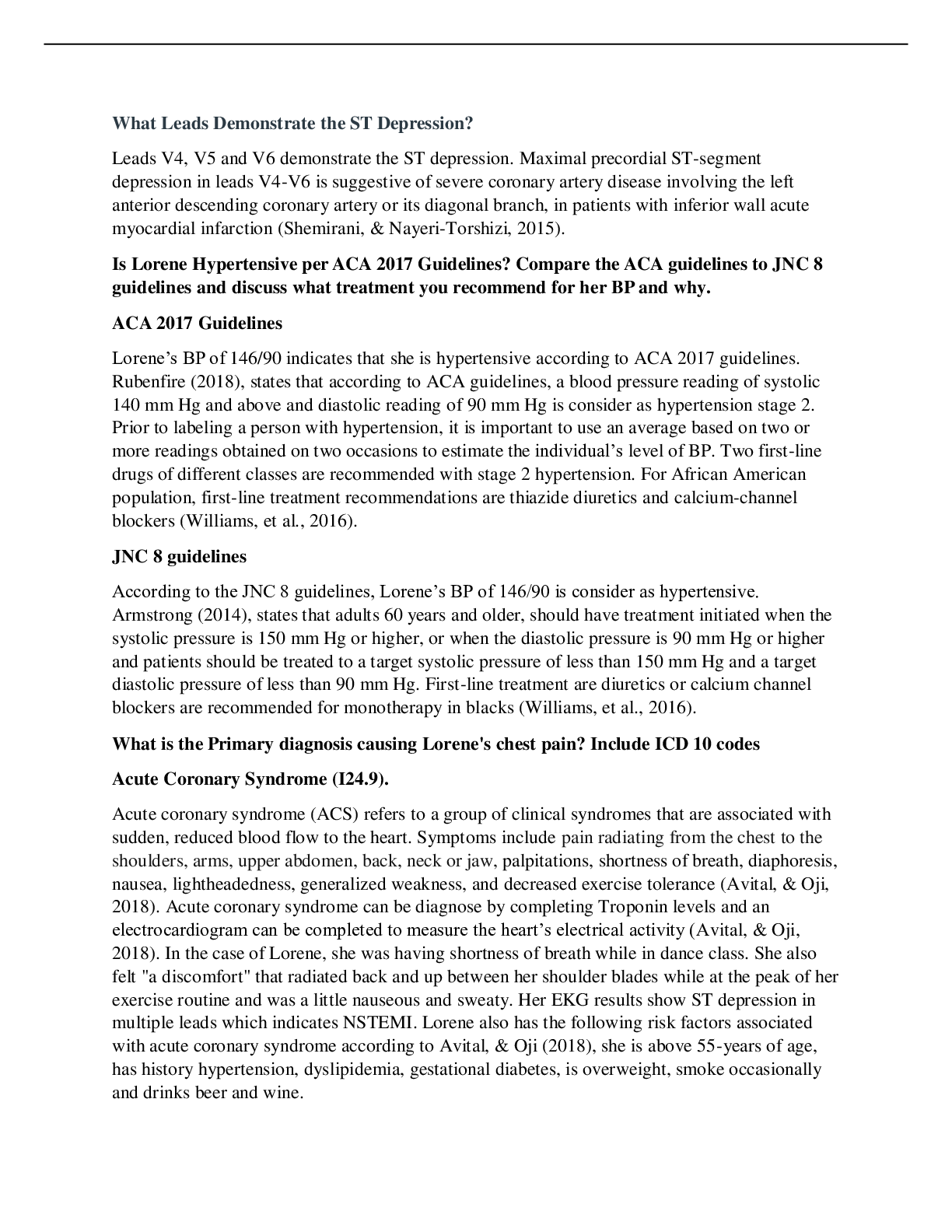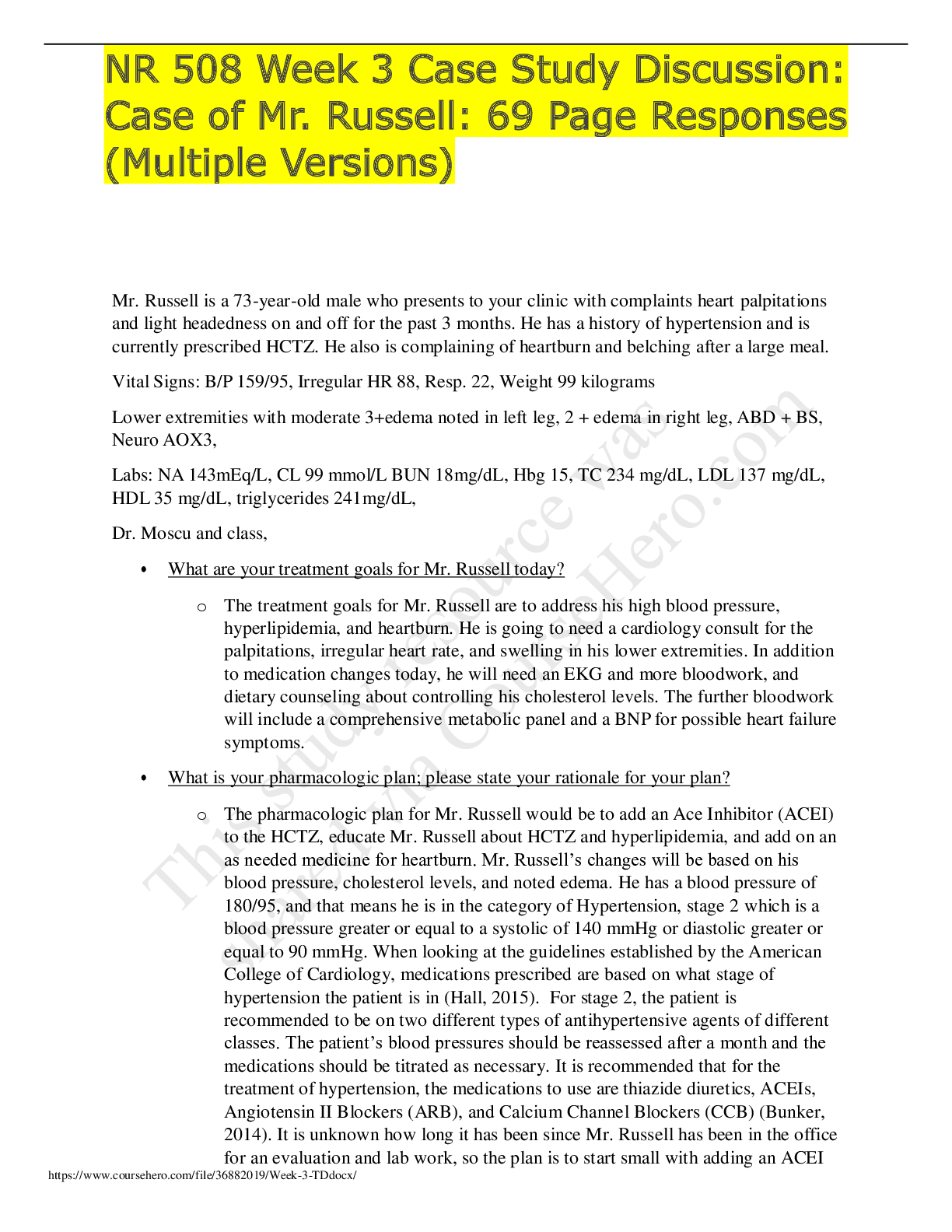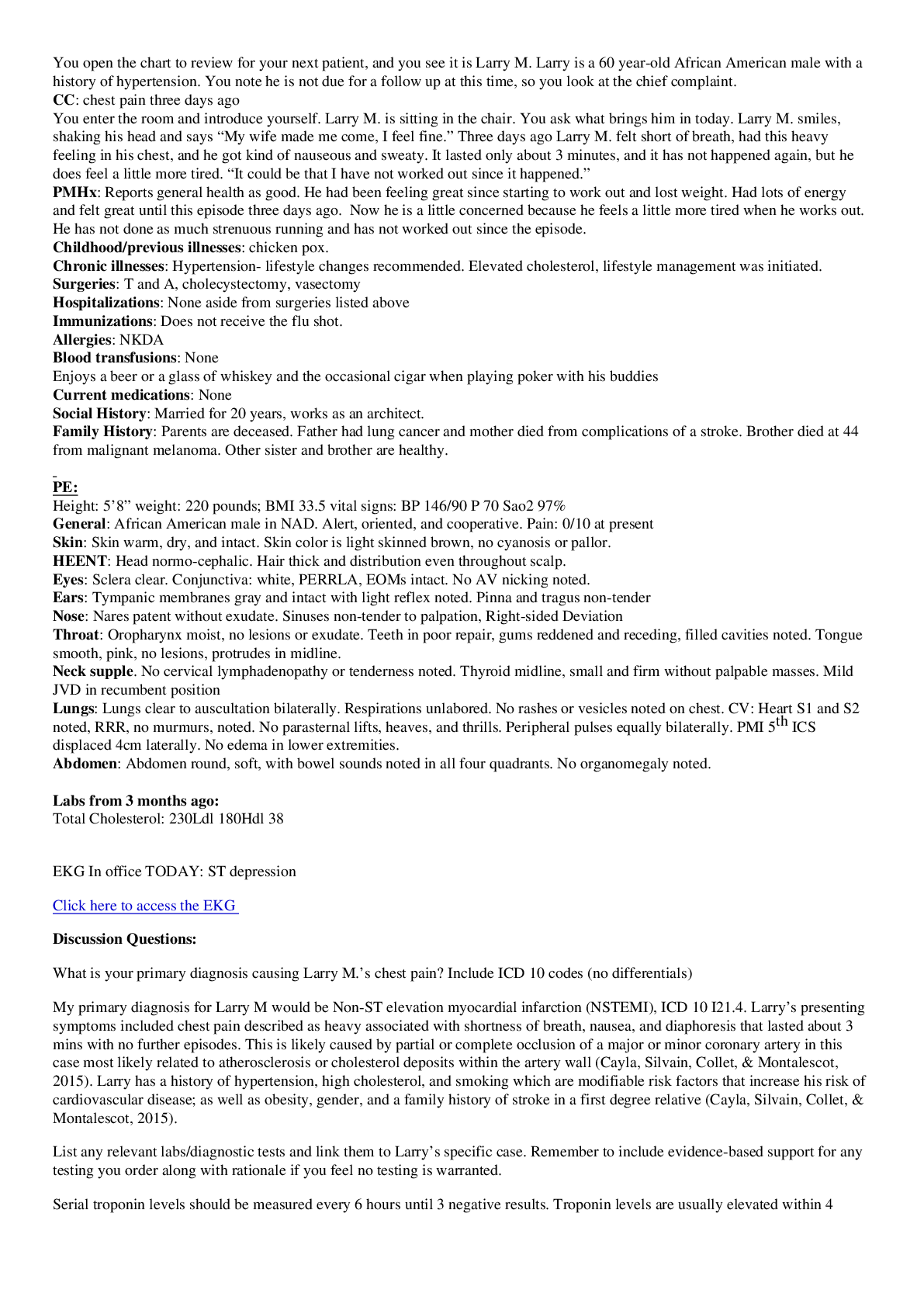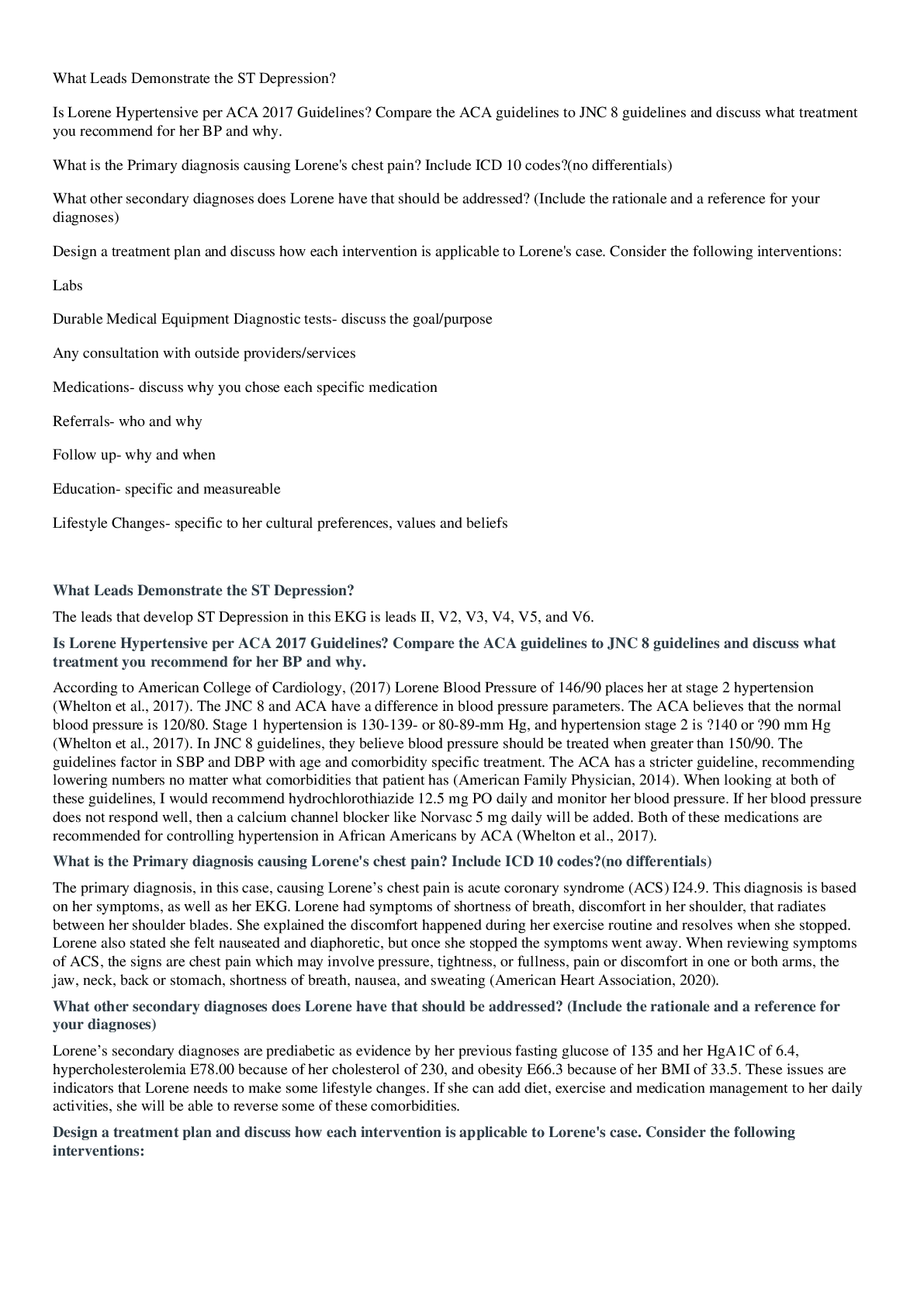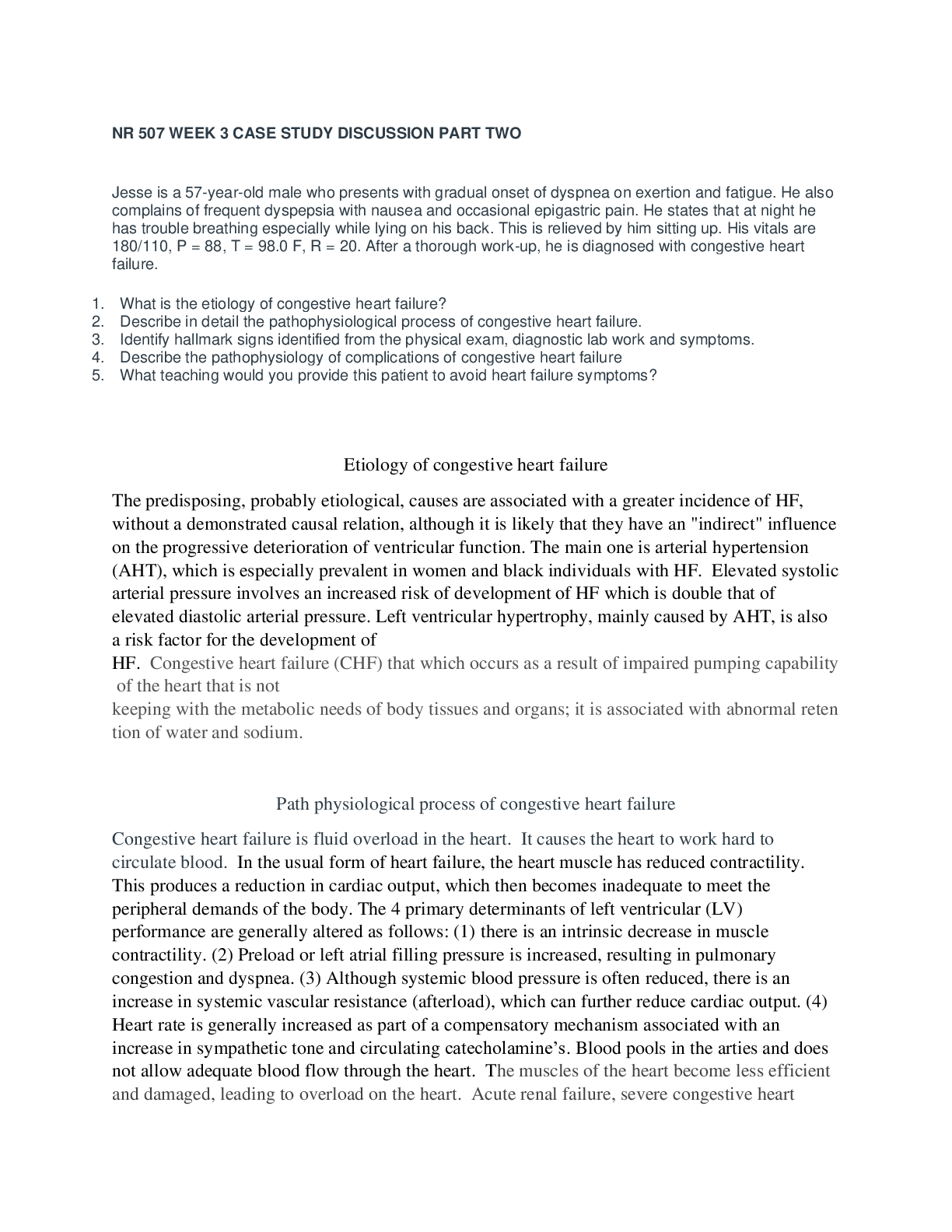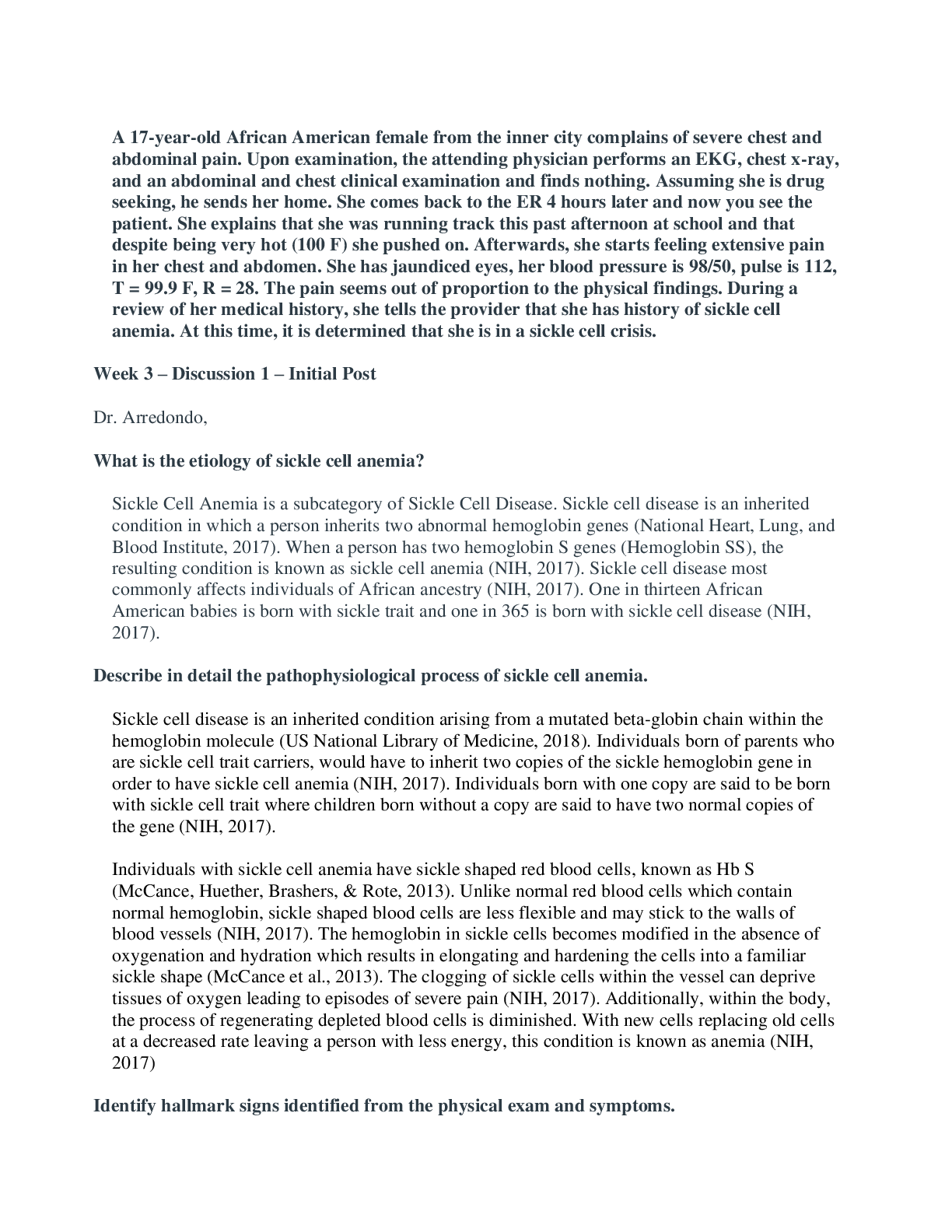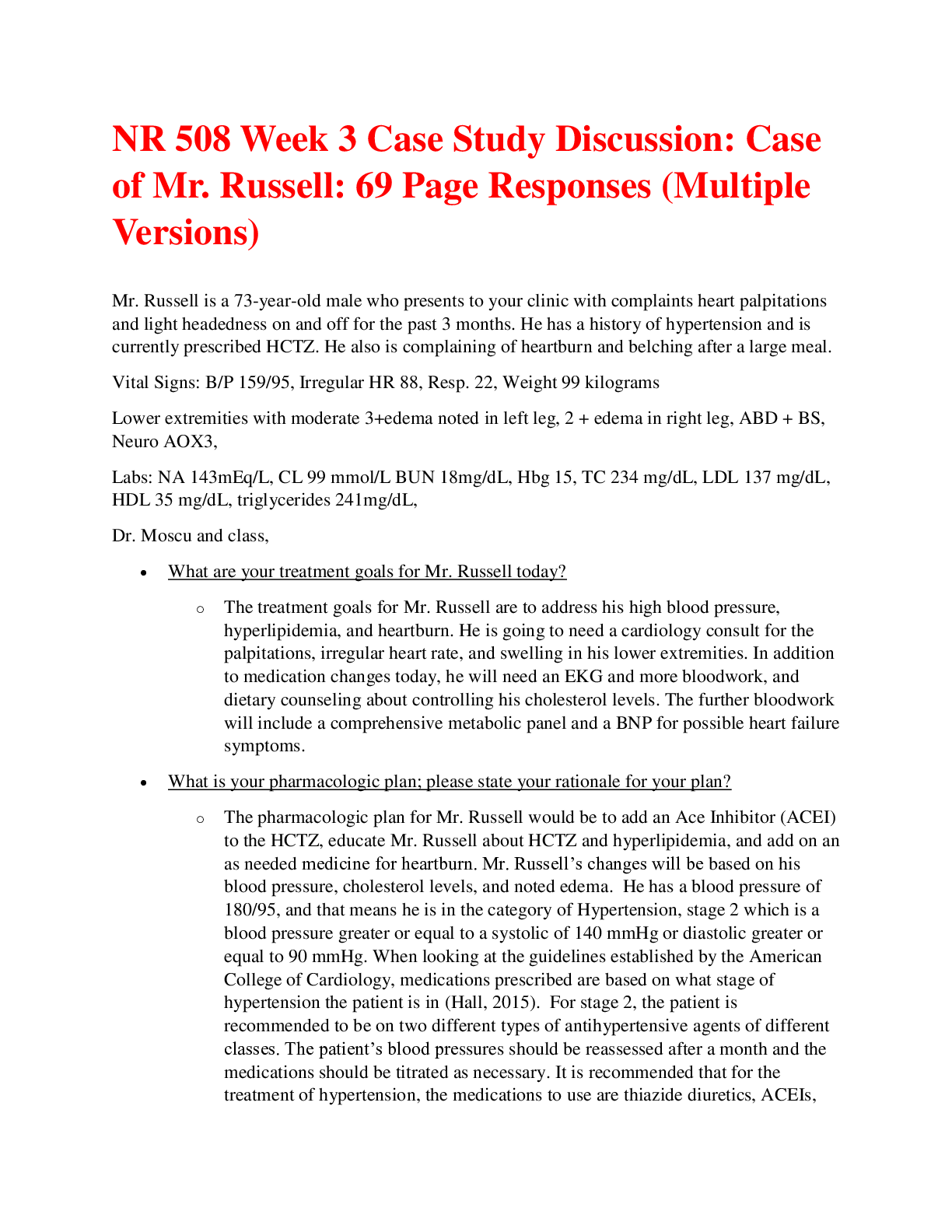*NURSING > DISCUSSION POST > NR 508 Week 3 Case Study Discussion: Case of Mr. Russell: 69 Page Responses (Multiple Versions)-Cham (All)
NR 508 Week 3 Case Study Discussion: Case of Mr. Russell: 69 Page Responses (Multiple Versions)-Chamberlain College Of Nursing:SATISFACTION GUARANTEED
Document Content and Description Below
Mr. Russell is a 73-year-old male who presents to your clinic with complaints heart palpitations and light headedness on and off for the past 3 months. He has a history of hypertension and is curren... tly prescribed HCTZ. He also is complaining of heartburn and belching after a large meal. Vital Signs: B/P 159/95, Irregular HR 88, Resp. 22, Weight 99 kilograms (217 lbs) Lower extremities with moderate 3+edema noted in left leg, 2 + edema in right leg, ABD + BS, Neuro AOX3, Labs: NA 143mEq/L (135-145), CL 99 mmol/L (96-106) BUN 18mg/dL (7-20), Hbg 15 (13-17), Total cholesterol -TC 234 mg/dL (less than 200), LDL 137 mg/dL (less than 100), HDL 35 mg/dL (40-50), triglycerides 241mg/dL (less than 150). What are your treatment goals for Mr. Russell today? Address concerning vital signs of HTN, irregular HR, palpitations, edema, lab values, heartburn/belching, preventative measures and education. Electrocardiogram (EKG) initially to rule life-threatening arrhythmias that may alter course of treatment or that need to be addressed immediately and/or need cardiology consult. Wilken (2016) supports EKG’s to helpfully evaluate palpitations and considers potentially essential for diagnosis in a primary care setting. It is also the first test used for therapeutic decision making for progression and/or stabilization of HTN impact (Woo & Robinson, 2016) Address HTN using the JNC 8 guidelines for HTN, and addressing potentially complications of undiagnosed HF including peripheral edema. The JNC 8 guidelines recommend in patients greater than 60 years of age (Mr. Russell is 73), without diabetes or chronic kidney disease to have blood pressure reading less than 150/90 (Elam, 2017). Mr. Russell currently fits into Hypertension stage I due systolic BP 140-159 and diastolic BP 90-99 per the JNC 7 guidelines that were unchanged in the JNC 8 guidelines (Woo & Robinson, 2016). . Echocardiogram and doppler flow studies are needed for diagnostic purposes for suspicious HF and/or cardiac dysfunction will need to be scheduled as soon as possible in an outpatient setting (Woo & Robinson, 2016). The recommended guidelines from the American College of Cardiology and American Heart Association (ACCF/AHA) include laboratory values needed for HF that include renal function, complete blood count, urinalysis, serum electrolytes including magnesium and calcium, hemoglobin A1c, liver function tests, fasting lipid levels, BNP, troponin T, and thyroid stimulating hormones (Woo & Robinson, 2016). These values are for screening and diagnosis of HF and organ function. These tests should be completed day of office visit prior to medication administration. Identify lifestyle modifications and preventative measures that Mr. Russell can work towards that This study source was downloaded by 100000831988016 from CourseHero.com on 04-24-2022 10:40:39 GMT -05:00 https://www.coursehero.com/file/37430370/NR508-week-3-discussion/ include smoking cessation (if applicable), diet modification, obesity, exercise, alcohol consumption, and illicit drug use as this is the first step of treatment for HF, cardiovascular disease, and hyperlipidemia (Woo & Robinson, 2016). Has Mr. Russell had his yearly influenza vaccination or pneumococcal vaccination in the last five years, if not, address. Lifestyle modifications such, diet, alcohol, exercise, can all impact his symptoms of heartburn and belching. Address new pharmacological approaches, see below. Overall, treatment goals are to optimize physiologic status, decrease risk of complications, prevent further progression of disease, promote patient well-being, education, and compliance (Kellicker & Cabrera, 2018). What is your pharmacologic plan; please state your rationale for your plan? Start ACEI, they are used for angina and reduced blood pressure and improve function for those with heart failure (HF) and are the first line therapy (Woo & Robinson). ACEI are drug of choice due to decreased morbidity and increase life span for all populations, and should be started immediately (Woo & Robinson, 2016). ACEI of choice would be captopril. A short-acting ACE inhibitor was chosen over a long-acting ACEI in case patient has adverse drug reactions (ADR) such as prolonged hypotension, angioedema, or renal impairment (Woo & Robinson, 2016). May consider long-acting ACE once patient tolerance determined. If Mr. Russell does not tolerate ACEI due to ADRs, the next drug of choice per the JNC-8 recommendation is angiotensin II receptor blockers (ARBs) (Elam, 2017). According to Woo & Robinson (2016), lowering LDL cholesterol levels are top priority, and first line treatment for high-risk cardiovascular disease patients, such as Mr. Russel, include lifestyle changes and medications concurrently. Reductase inhibitors should be used first, such as Atorvastatin, due cost and effectiveness (Woo & Robinson, 2016). Thiazide diuretics, such as, HCTZ, has been seen to cause hyperlipidemia with increase in cholesterol, LDL, and triglycerides (Woo & Robinson, 2016), so I would discontinue the HCTZ, and start a loop diuretic for it’s large natriuresis and decrease hyperlipidemia risk. Drug of choice is furosemide (Woo & Robinson, 2016). Furosemide is used help reduce edema and fluid retention in HF. ACEI are combined with diuretics if volume overload develops, such as the bilateral lower extremity edema present (Woo & Robinson, 2016). Diuresis alone may lower Mr. Russell's blood pressure enough to meet JNC 8 guidelines, to avoid hypotension, I would start both ACEI and loop diuretics at low doses and assess drug response. With this combination, electrolytes and renal function, and blood pressure need to be monitored closely. ACEI alter aldosterone function and may lead to hyperkalemia, while loop diuretics may decrease potassium. This study source was downloaded by 100000831988016 from CourseHero.com on 04-24-2022 10:40:39 GMT -05:00 https://www.coursehero.com/file/37430370/NR508-week-3-discussion/ Dietary changes alone may resolve Mr. Russells heartburn and belching, which include avoiding spicy food, decrease fatty food, chocolate, caffeine, alcohol, and smoking cessations (Woo & Robinson, 2016). However, a pharmacological intervention approach would be including adding an antacid to decrease heartburn. These are available over the counter, but Mr. Russell needs to read product labels because many antacids contain high sodium content and Mr. Russell needs to decrease his sodium intake (Woo & Robinson, 2016). Antacids also shouldn’t be taken with other medication because they may affect the absorption and effects, therefore, they should be taken two hours before or after other medications (Woo & Robinson, 2016). Mr. Russell should be encouraged to receive annual influenza vaccination, if hasn’t, as it is recommended for all patients (Woo & Robinson, 2016). In addition, the pneumococcal immunization should be provided starting at age 65 (Mr. Russell 73), or he may need revaccination, as it is indicated every years for patients 65 and older. What are five key patient educa [Show More]
Last updated: 1 year ago
Preview 1 out of 5 pages

Reviews( 0 )
Document information
Connected school, study & course
About the document
Uploaded On
Apr 24, 2022
Number of pages
5
Written in
Additional information
This document has been written for:
Uploaded
Apr 24, 2022
Downloads
0
Views
84

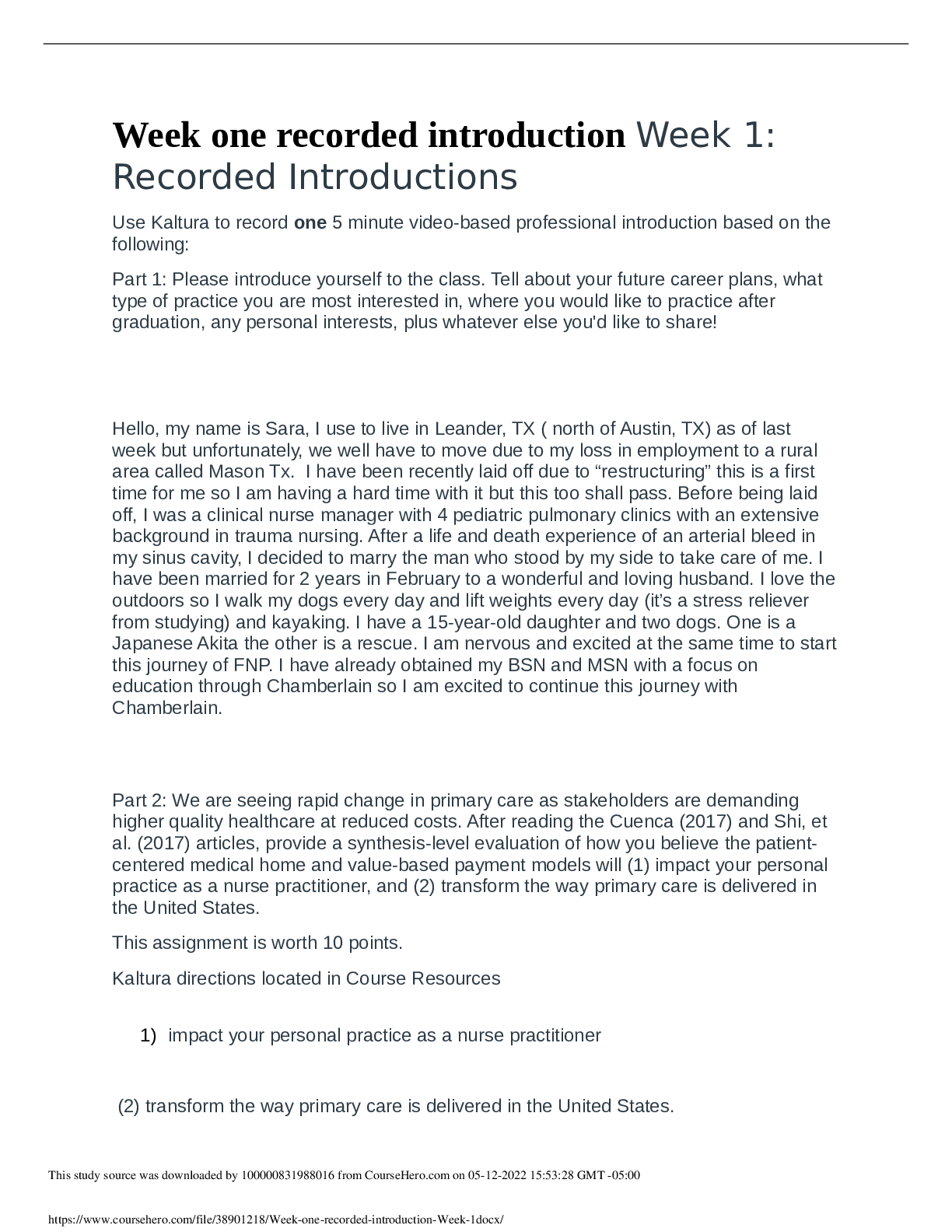


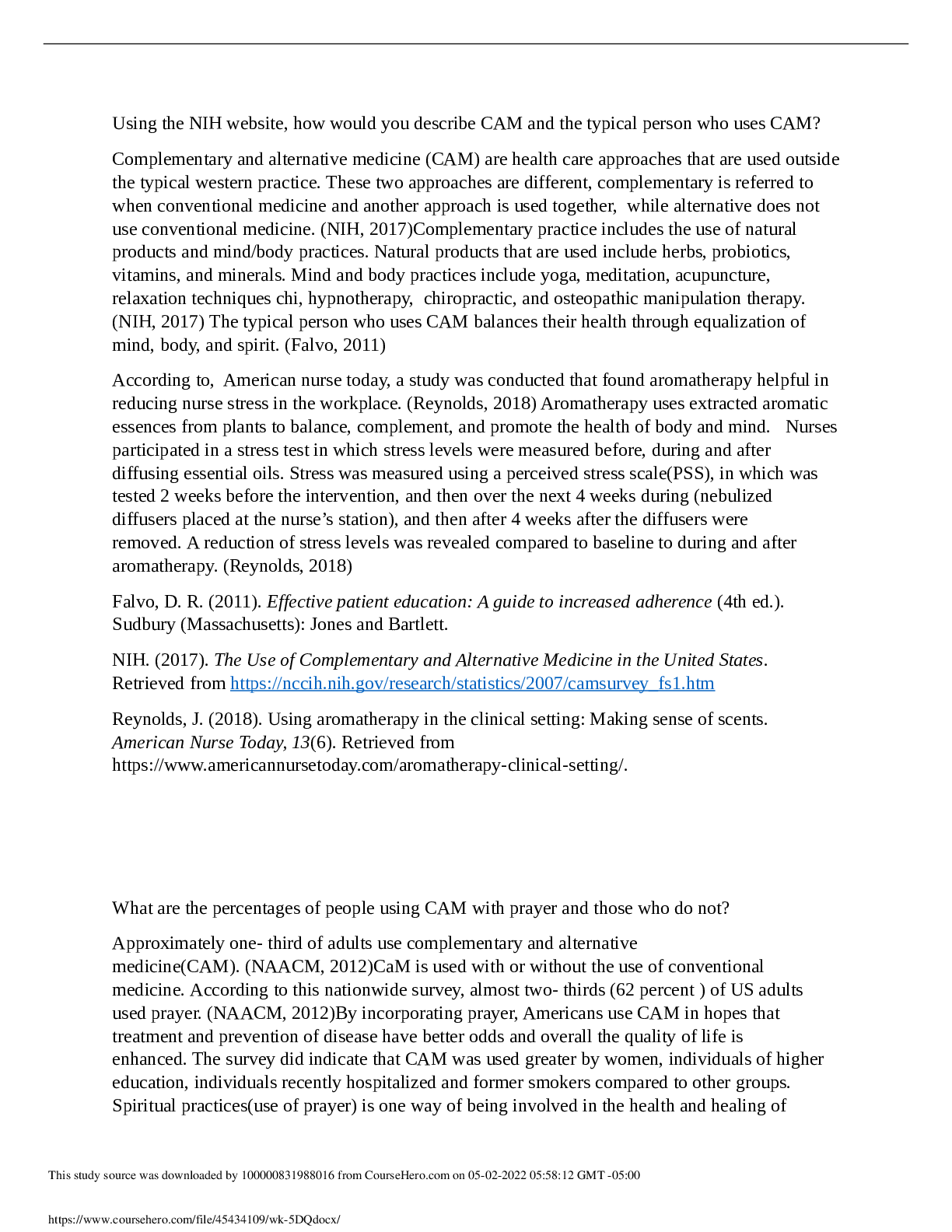


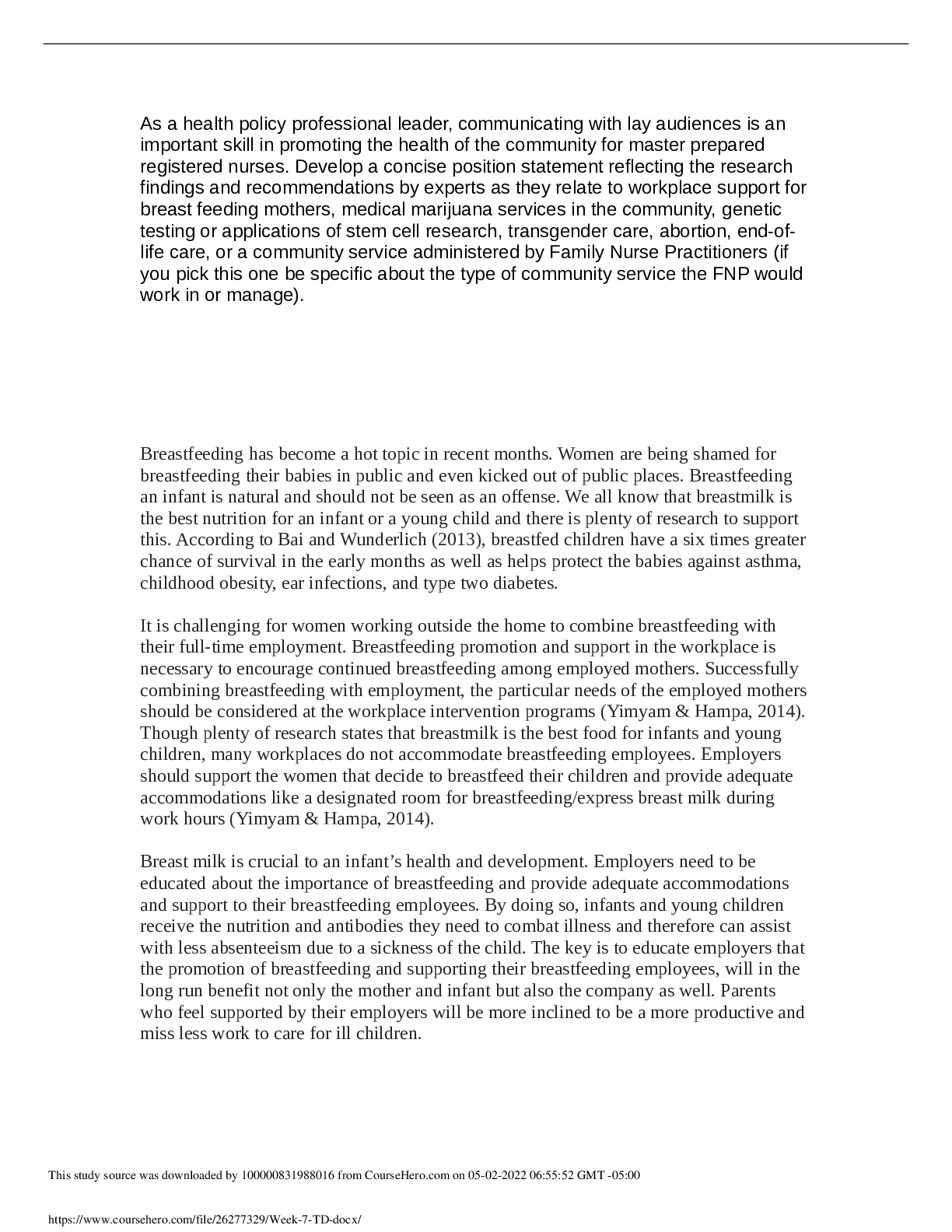
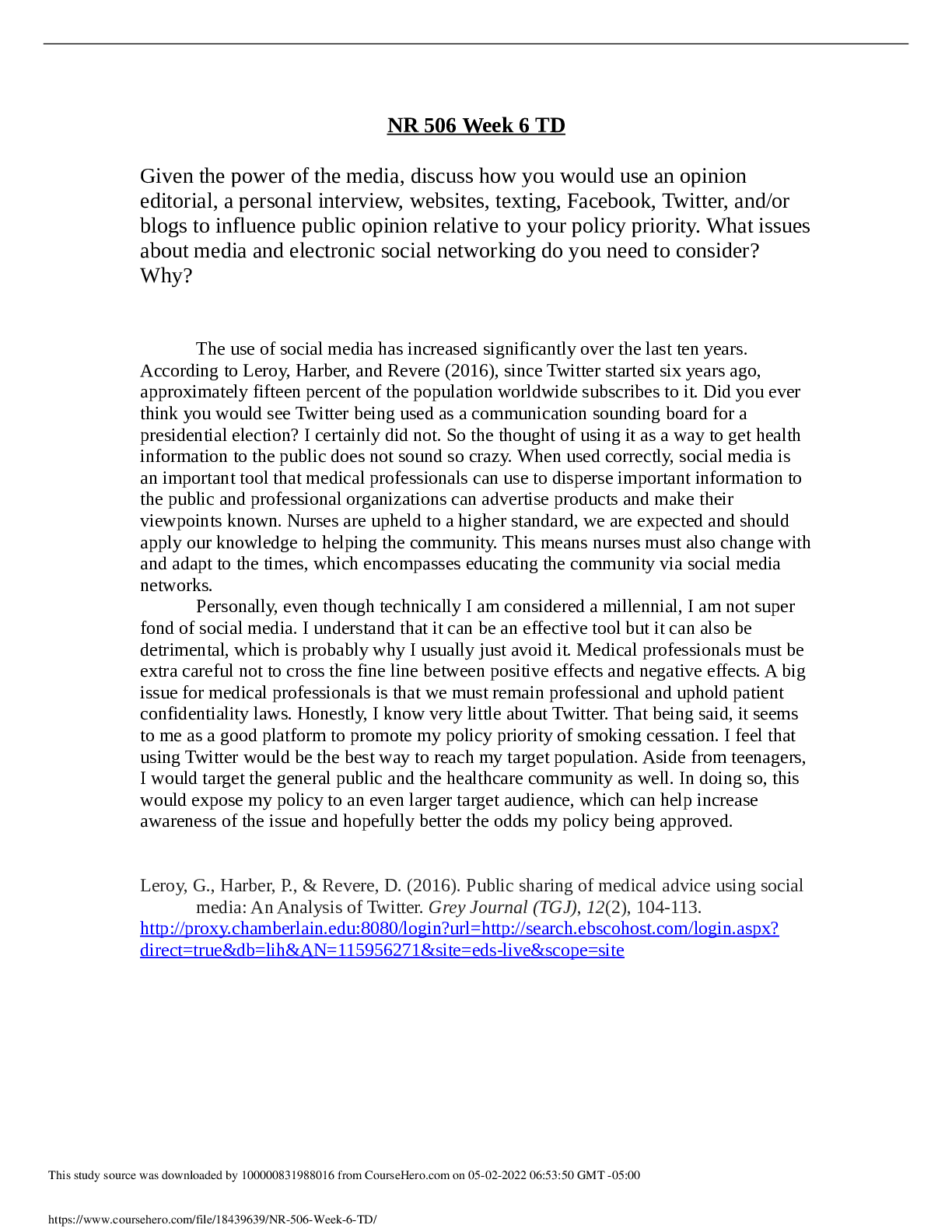
.png)
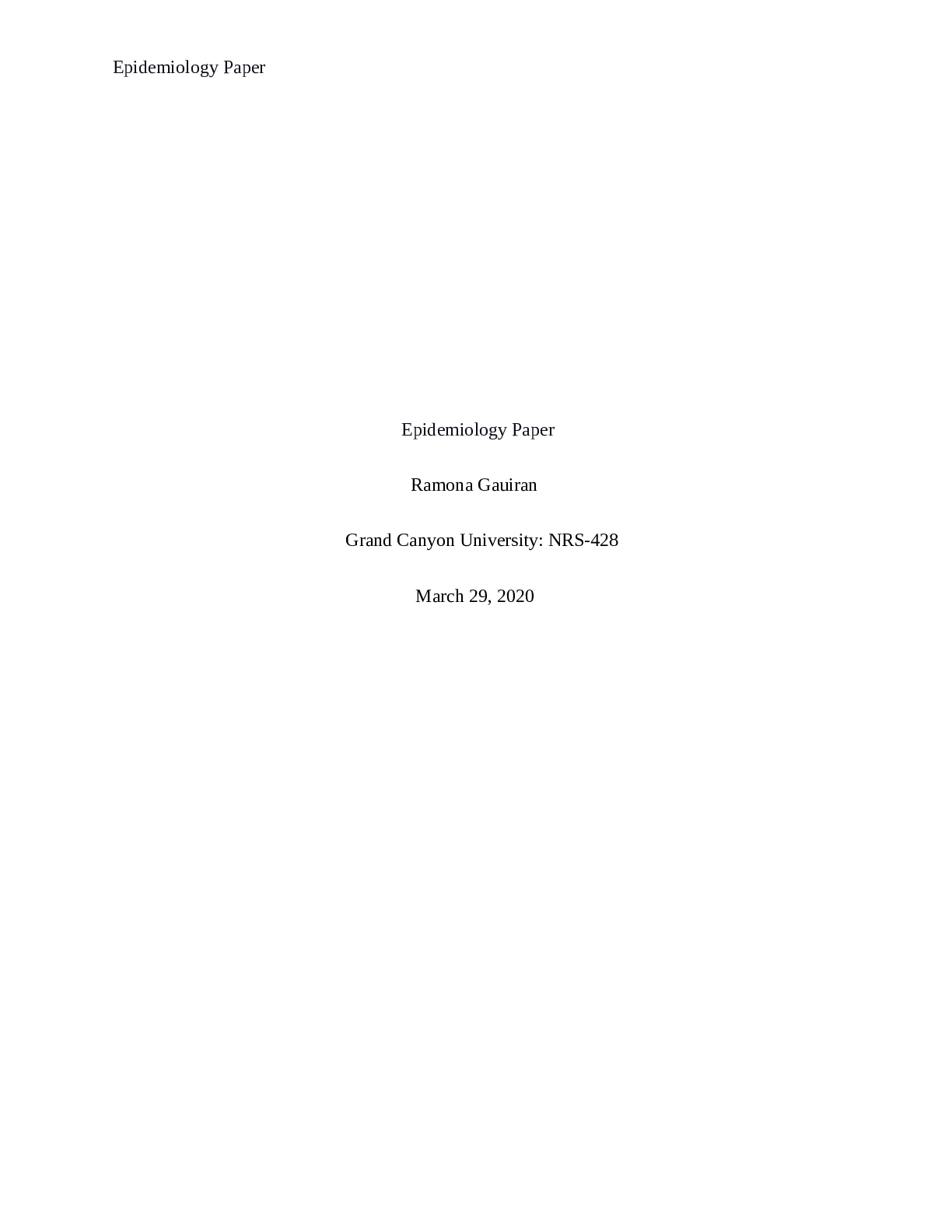
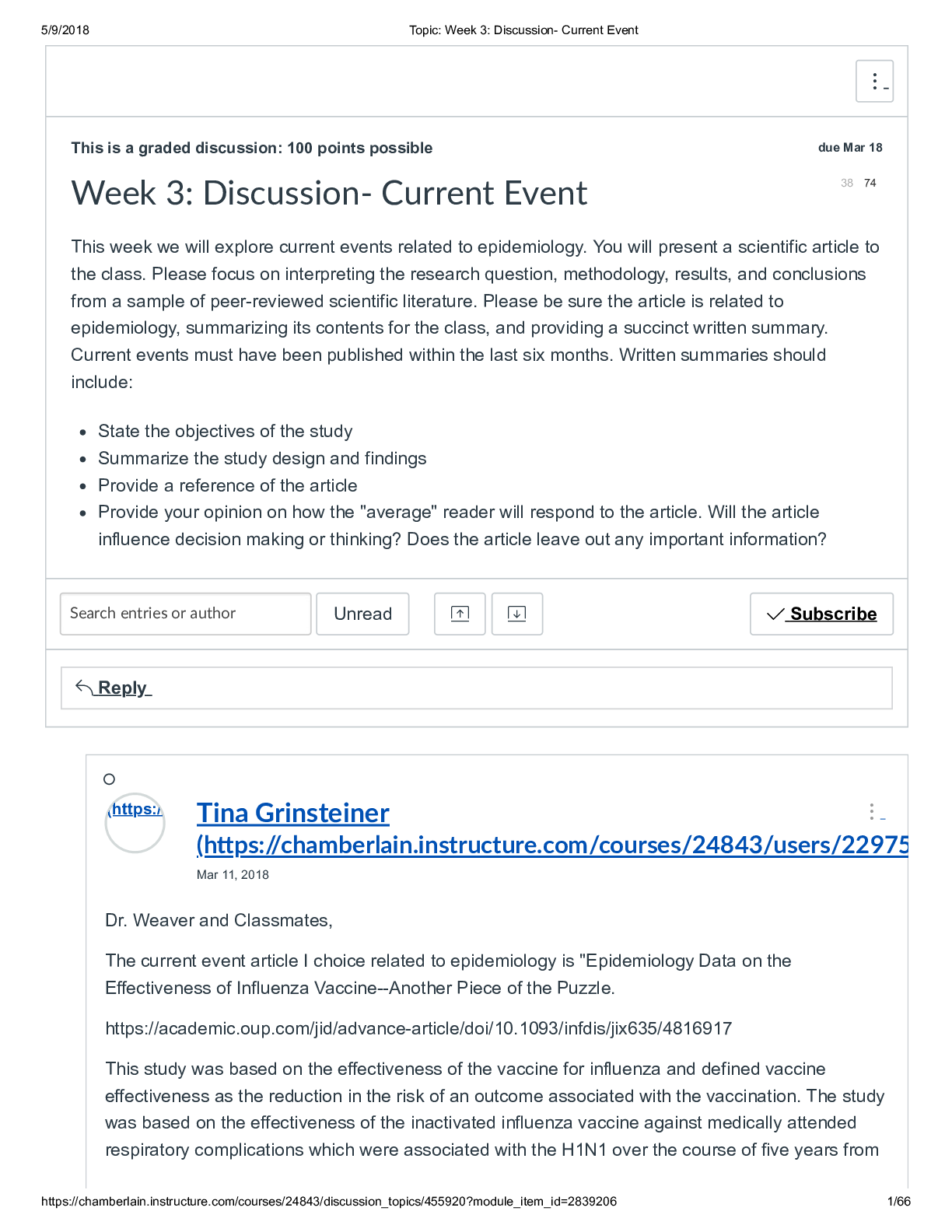

.png)

.png)
